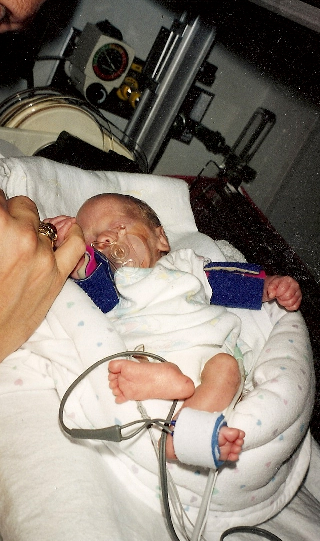
Diagnosis
Children at Risk
Children 1st is the single point of entry to a statewide collaborative system of public health and other prevention based programs. The mission of this program is to identify children who are at risk for poor health and delayed development. Children 1st partners with Newborn Screening to get families help as soon as possible.
Importance of Prenatal Care
Prenatal care is the health care you receive while pregnant. It is important to get early and regular prenatal care and to follow your doctor’s advice. Babies whose mothers do not receive prenatal care are more likely to be have low birth weight and other health related issues than those born to mothers who do get care.
Find out more about Prenatal Care.
Premature Birth

A premature birth or preterm birth is one that occurs at least three weeks before a baby’s due date or at less than 37 weeks of pregnancy. A full term birth is 40 weeks. The earlier a baby is born, the more likely it is that there will be health problems. Some premature infants will spend weeks or months hospitalized in a neonatal intensive care unit (NICU) and may face lifelong problems.
Preterm Labor and Birth – More Information from the National Institute of Child Health and Human Development
Medically Fragile
A medically fragile infant or child is dependent on life sustaining medications, treatments or equipment. Although their conditions may be considered stable, their care often requires skilled nursing. Prematurity, cerebral palsy, heart conditions,spina bifida, and traumatic brain injuries are examples of some conditions that might cause a child to be considered medically fragile.
Failure to Thrive
This is a term used to describe children with significantly low weight or weight gain. Failure to thrive can result from a variety of medical causes such as metabolic disorders, heart or lung problems, cerebral palsy or hormone deficiencies. It can also be the result of environmental factors such as poor eating habits, poverty, neglect or exposure to toxins or parasites.
Find out more about Failure to Thrive.
Drug Use during Pregnancy
The use of drugs such as marijuana, cocaine, amphetamines, and heroin during pregnancy may cause premature delivery, withdrawal symptoms, birth defects, behavioral problems and/or learning disabilities.
Find out more about Illicit Drug Use during Pregnancy
Fetal Alcohol Syndrome
Fetal Alcohol Syndrome can include physical problems and problems with behavior and learning. These conditions are the result of the mother drinking alcohol during pregnancy.
Find out more about Fetal Alcohol Syndrome Disorders
FASD, Strategies not Solutions Booklet
Obesity in Children
Obesity affects the health and well-being of a child both immediately and in the future. As children, they may develop high cholesterol or high blood pressure, pre-diabetes, bone and joint problems, sleep apnea and social and psychological problems. As they become adults, they are more likely to develop heart disease, diabetes, stroke, some types of cancer and osteoarthritis.
Find out more about Childhood Obesity
Preventing Childhood Obesity: 6 Things Families Can Do
Hearing and Vision Impairments
Children with hearing and vision impairments are at greater risk for developmental delays in speech and language development, communication and learning. Children who are identified early and receive appropriate interventions have fewer delays.
Find out more about Hearing Loss
Read about Rene’s journey coming to terms with the hearing impairments of her remarkable daughters
Learn about Identifying and Managing Hearing Loss in Young Children (en espanol)
Detección auditiva e intervención tempranas: ¿puede oír su bebé? – Este podcast es una traducción fiel de la conversación original en inglés con la doctora June Holstrum y la audióloga Pam Mason, y habla sobre la importancia de hacer una prueba exploratoria de la audición a todos los bebés tan pronto como sea posible después del nacimiento. También proporciona información que puede ayudar a los padres y proveedores de salud a determinar si un niño tiene pérdida auditiva, y a encontrar recursos adicionales.
Find out more about Vision Impairments
Find out more about Deaf-Blindness
Georgia Sensory Assistance Project
BEGIN – Center for the Visually Impaired
Fact Sheet: Your Child Failed the Form 3300 Vision Form